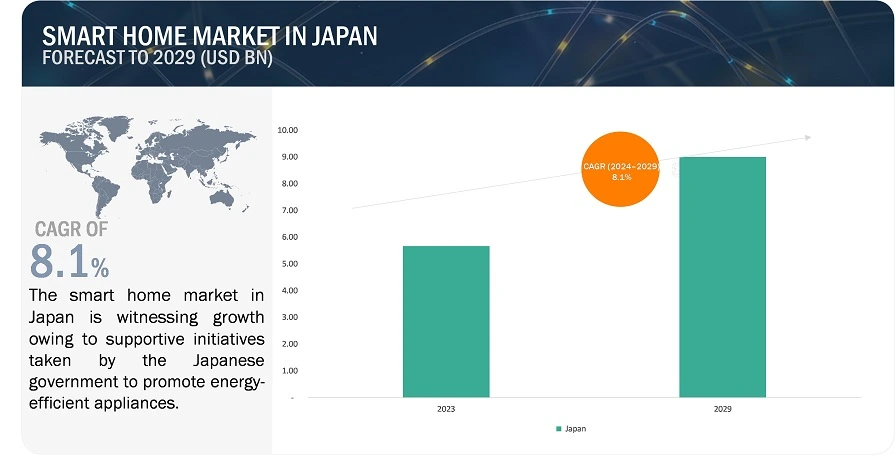Smart Home Market in the Japan
According to MarketsandMarkets, the smart home market in Japan is expected to grow from 5.67 billion in 2023 to 9.00 billion in 2029, at a CAGR of 8.1% from 2024 to 2029.
The Rise of Smart Homes in Japan
Japan has always been at the forefront of innovation, and smart homes are no exception. The concept of smart homes in Japan is built on the integration of various technologies that enhance convenience, energy efficiency, security, and health. The adoption of Internet of Things (IoT) devices is at the heart of this transformation. Through IoT, various appliances, lighting, heating, and security systems are interconnected and can be controlled remotely through smartphones, voice commands, or automated routines.
The country’s aging population plays a pivotal role in the growth of smart homes. Japan has one of the highest percentages of elderly people, with over 28% of its population being 65 or older. Smart homes offer solutions to address the challenges associated with elderly care, such as remote monitoring, health management, and improving safety. Technologies like motion sensors, smart medication dispensers, and emergency alert systems provide peace of mind to families while promoting independent living for elderly people.

Energy Efficiency and Sustainability
Energy efficiency is another key driver for the adoption of smart home technologies in Japan. With the increasing focus on sustainability, smart homes in Japan are designed to minimize energy consumption. Automated systems help regulate heating, ventilation, and air conditioning (HVAC) based on occupancy patterns and time of day, reducing energy waste. For instance, smart thermostats and lighting systems adjust automatically to optimize energy use, leading to lower electricity bills and a smaller carbon footprint.
Japan has been particularly proactive in developing energy-efficient solutions like solar power integration and energy storage systems. Many smart homes in Japan incorporate solar panels to generate electricity and store excess power in home batteries. These homes not only reduce their reliance on the grid but also contribute to Japan’s national goals of reducing greenhouse gas emissions and promoting renewable energy use.
Initiatives By Japan Government
Japan is actively promoting energy-efficient appliances through various public-private partnerships, aimed at reducing energy consumption and fostering sustainability in households. Local governments are offering rebates to incentivize the replacement of older appliances with more energy-efficient models. For instance, in October 2024, the Tokyo Zero Emi Point program has significantly increased its rebate amount from USD 170 to USD 522, encouraging residents to upgrade their appliances. The program is open to residents of Tokyo who purchase qualifying energy-efficient appliances, such as LED lighting, refrigerators, water heaters, and air conditioners.
Innovative Technologies in Japanese Smart Homes
Japanese smart homes incorporate a variety of innovative technologies that cater to the needs of the modern-day consumer. One of the most popular solutions is AI-powered home assistants, which provide voice-controlled access to various devices and systems. These assistants, such as Google Home and Amazon Alexa, are integrated with appliances like refrigerators, washing machines, and air purifiers, allowing users to control them with simple voice commands.
Robotics also plays a significant role in Japan's smart home landscape. Robots that assist with cleaning, security, and companionship are becoming increasingly common in Japanese households. Companies like SoftBank have developed advanced humanoid robots like Pepper, which are designed to provide elderly care and assistance in daily tasks.
Another important aspect of Japanese smart homes is the use of high-tech security systems. Facial recognition cameras, smart locks, and surveillance drones are part of the advanced security measures available to homeowners. These systems can be connected to a mobile app, enabling homeowners to monitor their properties remotely, enhancing safety.
The Future of Smart Homes in Japan
Looking ahead, Japan’s smart home market is set for significant growth. The government has been actively promoting the adoption of smart technologies through subsidies and incentives, particularly for energy-efficient and eco-friendly homes. The increasing demand for connected and automated living spaces, fueled by technological advancements and demographic shifts, will continue to shape the growth of the smart home market in Japan.
Related Report
Smart Home Market Size, Share & Trends by Product (Lighting Controls, Smart Speaker, Entertainment, Smart Kitchen, HVAC Controls, Security & Access Controls), Offering (Behavioral, Proactive), Sales Channel, Installation Type and Region - Global Forecast to 2029
Contact:
Mr. Rohan Salgarkar
MarketsandMarkets™ INC.
1615 South Congress Ave.
Suite 103
Delray Beach, FL 33445
USA : 1-888-600-6441
sales@marketsandmarkets.com
This FREE sample includes market data points, ranging from trend analyses to market estimates & forecasts. See for yourself.
SEND ME A FREE SAMPLE





